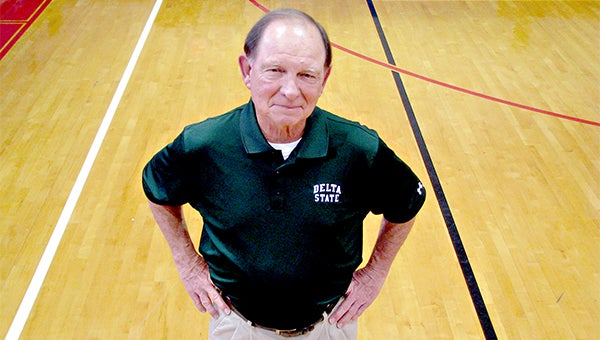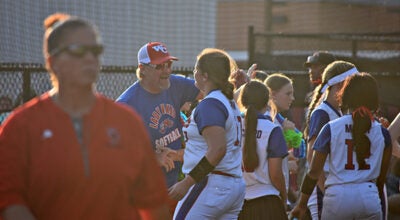Clark proud, humbled to have DSU’s court named for him
Published 12:33 pm Tuesday, January 20, 2015

Vicksburg resident Lloyd Clark stands in Warren Central’s gym, where he coached the girls basketball team from 1975-83. Clark went on to win three Division II national titles at Delta State, and recently had the court there named in his honor. (Ernest Bowker/The Vicksburg Post)
Lloyd Clark vividly recalls the night, 25 years ago, when he stood on the court at Delta State’s Walter Sillers Coliseum, held the Division II women’s national championship trophy high in the air, and soaked in the roar of the crowd.
“The goosebumps were so big they looked like eggs,” he said with a smile. “It was a great feeling.”
Earlier this month, the 74-year-old Vicksburg resident and longtime Delta State coach walked out onto the same court and got that feeling again. Surrounded by family, friends and fans, he took a giant pair of scissors and cut the ribbon to rename the arena’s floor “Lloyd Clark Court.”
It was a step into immortality that left him both proud and humbled.
“A guy named George Walters Booth started a scholarship in my name and immortalized my name. That’s always going to be there. That’s the way having your name on the court is. It’s going to be that way as long as there’s a basketball court at Delta State,” Clark said. “I’m very humbled by it. I’m just a guy who never played a game and had some good players at the right time.”
Clark’s path to legendary status at Delta State started in Vicksburg. After graduating from DSU, he was hired as a teacher and coach at Warren Central in 1969. The catch was, Clark didn’t know what he was the coach of. He was promised the first job that came open, but didn’t know what sport it would be.
It turned out to be eighth-grade boys and girls basketball. A few years later the varsity girls head coaching job came open, and he took it and his path in life was set.
“At one point I interviewed for a job at Dexter High School. I stayed at Warren Central because I wanted to work my way up,” Clark said.
Clark had coached baseball and football, and also officiated football games, but never played organized basketball. He read books on the subject, soaked up as much knowledge as he could from other coaches, and quickly became one of the best in the business.
Clark went 245-42 in eight seasons at Warren Central from 1975-83.
Clark’s best team was the 1981-82 Lady Vikes. Led by future Ole Miss star Alisa Scott, they won their first 39 games before losing to Harrison Central — which was in the middle of a run of seven consecutive state titles — in the Class AA state championship game.
More than 30 years later, the loss still haunts Clark. He said that after retiring from Delta State in 2002, he considered returning to the high school ranks to chase the state championship that got away.
“I try to forget it as much as I can,” Clark said somberly. “Harrison Central had always been our albatross. We’d beaten them the year before in the South Mississippi tournament. In the finals they slowed the ball down and that was difficult for us to deal with.”
Not long after that bitter defeat, Clark moved on to the next challenge — college. The women’s team at his alma mater Delta State needed a coach, and it was a job Clark was eager to take. The fact that he knew about a dozen members of the 15-person selection committee probably helped his cause, he admits, but it didn’t take long to show that Clark was the right man for the job.
He went 20-8 in 1983-84, his first season at Delta State, when the team was still playing at the Division I level. By 1986 he’d won three Gulf South Conference championships and had DSU in the Division II final four. Finally, after a couple of NCAA Tournament disappointments, he led the Lady Statesmen to the D-II national championship in 1989.
The championship game that season was played at Sillers Coliseum, which made it even more special.
“When I walked out and they handed me that trophy, I held it up for the crowd to see. The goosebumps were so big they looked like eggs,” Clark said.
As great an accomplishment as it was, Delta State’s dynasty was just getting started. It repeated as national champions in 1990, won again in ’92, and was the national runner-up in ’93. Delta State went 142-22 during that five-year stretch.
“It was a great time. Just like at Warren Central, I had some great kids,” Clark said. “It takes a special kind of kid to win this thing. You can be as good a coach as you want to be, but if you want to win championships you need good players.”
Delta State continued to be a national championship contender for the next decade, but didn’t win another one. Clark never had a losing season, reached the final four once and the elite eight three times, yet couldn’t quite get over the hump.
“We had some good kids, won some conference championships, went to the elite eight a couple of times. There’s certain things you have to have to win a national championship, though, and we didn’t have it,” he said. “We had some good teams, but were always missing some little part of a national championship caliber team.”
When Clark retired at the end of the 2001-02 season, his resume included a 494-98 record, 10 Gulf South Conference titles and three national championships. He was the GSC coach of the year five times and the NCAA Region coach of the year three times.
Retirement only allowed others to take stock of his accomplishments and throw more honors his way. Clark was inducted into the Delta State Hall of Fame in 2003 and the Mississippi Sports Hall of Fame in 2006.
Then, this year, came the court dedication. He was also inducted into Delta State’s Hall of Legends, which was started in 2014 and currently has just four members — Clark, longtime university president Kent Wyatt, former women’s basketball coach Margaret Wade, and longtime staff member H.L. Nowell.
“Those are the kind of people they’ve named buildings after. I’m in good company,” said Clark, who has also been a proud ambassador of Delta State since the 1960s. He, his wife, two sons and two brothers-in-law attended school there. “Delta State has been a big part of our family.”
And now Clark is a part of it forever.
“I’ve been very humbled by it,” he said of all the attention and accolades. “You’re talking about somebody that is getting accolades for coaching basketball and never played the game himself. That’s humbling.”






